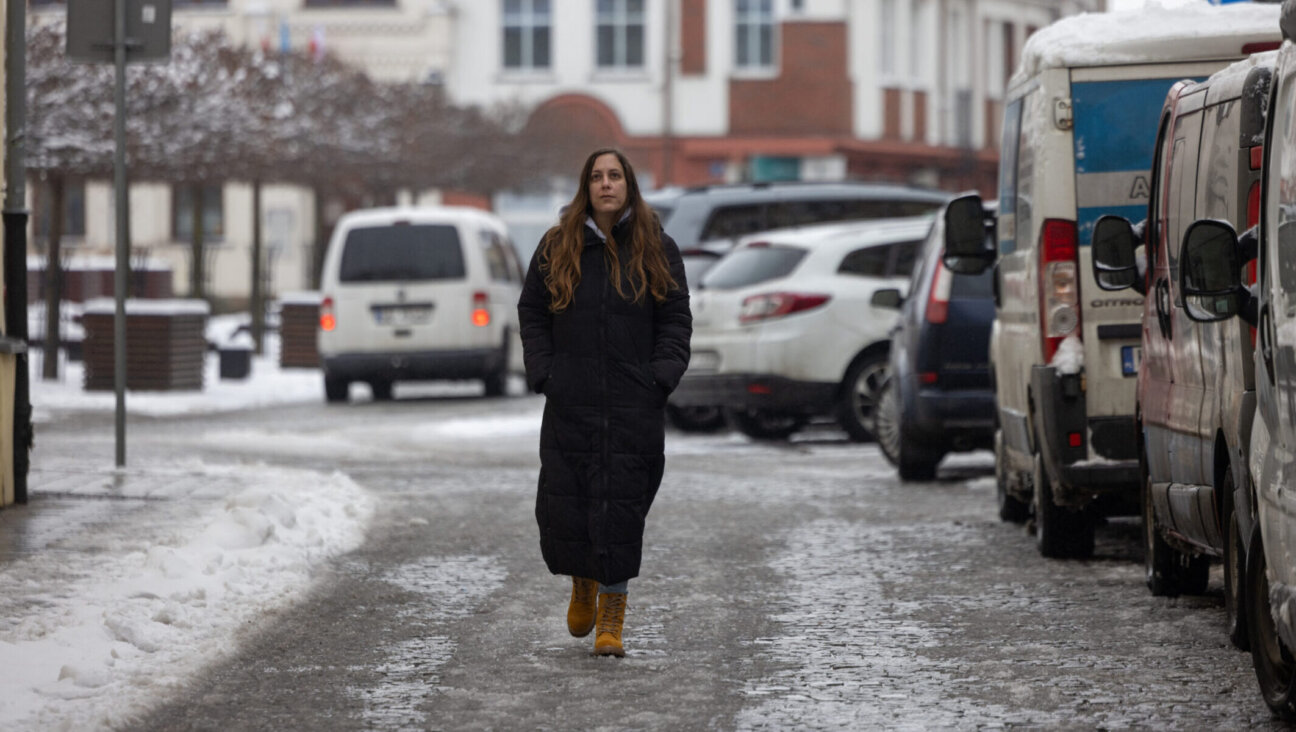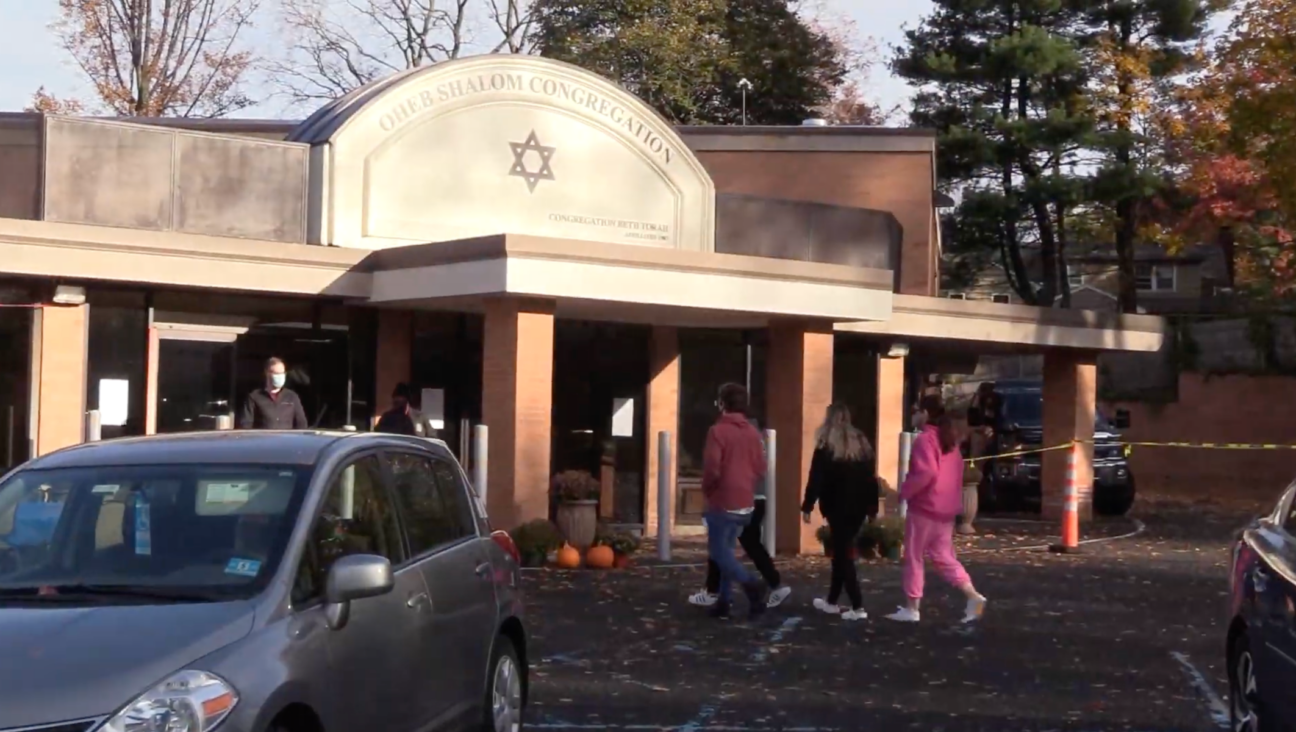Orthodox Jews are leaving Lakewood for a neighboring suburb. How much will they change it?

Jackson Township, New Jersey. Image by Ari Feldman
You won’t see any synagogues driving around Jackson, N.J.
But they’re there — at least 15 of them, hidden inside unassuming houses on wooded lots, according to Tzvi Herman, an Orthodox resident of the town.
Though invisible to passersby, the synagogues are signs of the sudden growth of the Orthodox community in this spacious south Jersey suburb over the past six years. Orthodox Jews require synagogues within walking distance of their homes, because they do not drive on Shabbat.
They are also signs of defiance: They were built without approval from Jackson’s planning board, in quiet protest of ordinances that they say were designed to prevent Orthodox Jews from expanding into the town, such as one that bans building houses of worship on small lots.
The synagogues are an apt metaphor for the paradox of Jackson: Haredi families are moving in to escape the overdevelopment of nearby Lakewood, which is home to the second-largest yeshiva in the world.
Yet those families accuse some residents and political leaders of trying to stop them from building the infrastructure they need as observant Jews to balance religious life with suburban life.
“The Jews here don’t want the overdevelopment as much as the non-Jews don’t,” Herman said.
The influx of Orthodox Jews seems to some Jackson residents as a harbinger of problems that have plagued other towns with large Orthodox populations: congested roads, massive multifamily developments and public school budget crises. The town is already being sued by the federal government and an Orthodox advocacy group over rules that Orthodox Jews say were designed to keep them from moving in.
Herman himself is both a symbol and an agent of change. In November, he won a term on the Jackson school board, becoming the first Orthodox resident elected to public office there. He ran in order to address what he perceives as a shortchanging of the town’s Jewish students.
He believes the opposition to his candidacy, in the form of two write-in campaigns, was motivated in part by anti-Orthodox sentiment — a charge that political leaders in the town deny.
“Once my name became public, all of a sudden there were challengers,” he said. “Automatically, because I’m a religious Jew, they think my agenda is the same as up north.”
‘Uncertainty and unease’
Herman, 31, runs a home appliance store, and lives in a colonial-style home on a two-house cul-de-sac. In the summer, he says, the leaves on the trees around his backyard seclude it, and his large in-ground pool, from the neighbors completely.
It’s a far cry from where he grew up, in Midwood, Brooklyn, and also from the family’s last home, in Lakewood.
“We couldn’t ride our bikes down the block,” he said, recalling his childhood. Through the French doors, he can see the entrance to the forest path that takes him to the house, converted into a synagogue without town approval, where he prays each morning. “Over here, my seven-year-old daughter, she roams freely.”
He acknowledged that the synagogues were built without proper zoning approval, but insists they’re in a “legal gray area,” since most have families living in them full time. He cited a Supreme Court of New Jersey decision allowing religious services at the home of a rabbi in Deal, N.J. The synagogue he attends, he said, is applying for a variance to be legally operated as a synagogue.
“The zoning laws are draconian,” Herman said. “We’re simply asking for our First Amendment right to pray.”

Tzvi Herman, standing in front of his home. Image by Ari Feldman
Jackson, once a sleepy hamlet, has grown by more than 50% over the past 20 years, to an overall population of 62,000. It’s not a heavily Jewish town — the only current legal synagogue in its boundaries is a Messianic Jewish temple. But since about 2014, Herman says, about 1,600 Orthodox families have moved in, most coming from overcrowded Lakewood.
Despite the long term growth of the town overall, and a new crop of residents coming from New York City amid the pandemic, the influx of Orthodox Jews has raised fears about development in the mode of Lakewood, directly east of Jackson, where multi-family homes abound and yeshiva school buses congest the streets twice a day.
The growth and the problems associated with it are very real, said Marc Pfeiffer, the assistant director of the Bloustein Local Government Research Center at Rutgers University.
“I don’t know of another situation in the country where the norms of growth have been stressed the way it’s happening here,” he said of Lakewood and surrounding towns, including Toms River and Howell, that are seeing more Orthodox residents. “It’s creating uncertainty and unease.”
On social media, for example, loud voices have fed fears of Orthodox Jews rearranging the town’s character and finances. One group, Rise Up Ocean County, was kicked off Facebook for violating hate speech rules after an advocacy campaign by Orthodox groups.
In 2017, Jackson’s town council passed an ordinance that prevented the building of school dormitories in the township, prompting a 2017 lawsuit by Agudath Israel of America, the Orthodox advocacy and lobbying group, and a second suit this year from the Department of Justice, which both claim the ordinance was designed to prevent the building of live-in yeshivas.
Jackson’s council repealed the ordinance in May, shortly after the announcement of the DOJ suit, but the lawsuits are still ongoing. Michael Reina, Jackson’s mayor, did not respond to multiple requests for comment.
Todd Porter, president of the town’s Republican Club, defended the dormitory ordinance and others, saying that he trusts Jackson’s leaders to set responsible rules for development.
“I don’t think there was some sort of nefarious plot to keep the Orthodox out of town,” he said.
An ‘under the radar’ campaign
In Jackson and other towns that have seen large influxes of Orthodox Jews, concerns about overdevelopment line up next to concerns about the budgets of local public school systems.
The shadow of Lakewood and Ramapo, N.Y., loom large. In those towns, boards of education with a majority of members elected by the Orthodox community have limited funding to the public schools while paying millions in bussing for the expanding yeshiva population. They have done so because school boards in both states are required by state law to pay for bussing for both public and private school students.
Yet the state only reimburses local school districts based on the number of public school students. In heavily Orthodox towns such as Lakewood and Ramapo, which includes Monsey, where the number of yeshiva students can be as much as six times the number of public school students, that funding imbalance has led to budget crises and lawsuits.
Herman said he ran for a seat on the seven-member Jackson Board of Education to ensure that the board was providing state funding for services like speech therapy and special education to Lakewood yeshivas serving Orthodox students from Jackson, as it is required to do under state law.
According to Mordy Burnstein, an administrator for a Lakewood girls yeshiva who served as Herman’s de facto campaign manager, there are about 2,400 school-age Orthodox students in Jackson. Jackson’s public schools have about 8,300 students.
Herman’s candidacy prompted some Jackson residents to worry on social media that the town would soon see its board controlled by Orthodox residents — and that this, in turn, could drain funds from the public schools.
“Remember the other candidate, Tzvi Herman, is going to be wasting all of our money busing kids to outside private schools to Lakewood,” reads one woman’s comment in a Facebook group for Jackson residents.
Herman fended off two vigorous write-in campaigns, which he believes were expressions of anti-Orthodox sentiment orchestrated by the town’s powerful Republican Club.
The club denies any official support for Herman’s opponents or for any measures designed to make the town less appealing to Orthodox Jews.
“The organization is in no way anti-Orthodox,” said Porter, pointing to several Orthodox members, including a man who worked on Herman’s campaign.
Herman rejects the notion that he would want to harm the public-school system or drain its budget.
“You have kids who are educated properly, it’s a much better quality of life for the entire neighborhood,” he said. “So it’s deeply important to me and the religious community that the public school systems are strong. We’re not trying to gut it.”
Herman began his campaign on his own, but quickly picked up support from Burnstein, the girls’ school administrator, and Avi Schnall, director of Agudath Israel in New Jersey, when his two write-in challengers emerged.
Schnall said that the local chapter of Agudath Israel threw its full weight into the effort despite being in ongoing litigation with the town, increasing its grassroots outreach efforts about the school board campaign after Herman’s write-in opponents emerged.
Though the organization is a nonprofit, and legally prohibited from endorsing a political candidate, Schnall said he felt the organization could support Herman because he didn’t have any official opponents on the ballot.
“In the community meetings, it wasn’t, ‘Here’s why you should support Tzvi Herman,” it was, ‘Here’s why it’s important to have an Orthodox member on the board,’” Schnall said. “But it was never a formal endorsement.”
Still, Schnall said, “It was all done under the radar, for, let’s call it, the outside world.”
‘Tzvi is an Orthodox gentleman’
Mike Braun, a longtime elementary-school teacher, and Allison Barocas, a business manager for a large pharmaceutical company, were Herman’s write-in opponents.
Neither directly attacked Herman.
Braun said he ran to offer an educator’s perspective on the town’s tightening budget, and didn’t attempt to get on the official ballot because his school had not yet released its pandemic reopening plan, without which he couldn’t know if he would have time to serve on the board.
“I understand it looks a certain way, because Tzvi is an Orthodox gentleman,” Braun said. “That is not related to anything I did.”
Barocas did not respond to multiple requests for comment.

One the remaining signs from Mike Braun’s campaign. Herman and his allis thought that the amount of signs Braun put up was evidence of his financial support from Republican groups. Braun says he only paid $250 for all the signs, and was trying to get his name in front of the township’s residents. Image by Ari Feldman
Schnall said that he believes the two write-in campaigns were clear attempts by the town’s Republican leaders to field alternative candidates to the Orthodox Jewish candidate. He points to the fact that both campaigns were announced only after the official slate of candidates came out, and Herman was the only person who had garnered the signatures and filled out the paperwork to get his name on the ballot.
“Someone fell asleep at the wheel by not putting up a candidate,” Schnall said.
Herman received about 10,000 of the roughly 19,000 votes cast, with the two write-in candidates splitting the rest. Yet he sees his victory as a refutation of anti-Orthodox sentiment in the town.
“My election clearly shows that there’s a large percentage of Jackson that’s not interested in the grievance politics,” he said.
Herman takes office in January, and he will have to work to convince Jackson residents that he is not in favor of the town becoming a second Lakewood. (Herman’s term will last a year, since he is filling the space of a board member who resigned earlier this year.)
He believes that Jackson needs to partner with Lakewood to lobby the state to change its funding formula for towns with large private-school populations. He estimates that within six years, there will be more Jackson children going to Lakewood yeshivas than Jackson public schools.
Jackson is already facing increasing budget woes: New Jersey’s state legislature cut state funding to Jackson’s schools by 5% in its 2019-2020 budget. (That budget increased Lakewood’s funding by nearly 64%.)
“I’m in the best position to help the township understand the shift in demographics that’s inevitable in Jackson,” he said. “If the state doesn’t change, Jackson is going to be in a similar boat as Lakewood.”
Correction, 12/10/20, 10:10 a.m. — A previous version of this article incorrectly stated that Agudath Israel set up call centers for Herman’s campaign. The call centers were meant to encourage Orthodox residents to vote.
Ari Feldman is a staff writer at the Forward. Contact him at [email protected] or follow him on Twitter @aefeldman
A message from our Publisher & CEO Rachel Fishman Feddersen

I hope you appreciated this article. Before you go, I’d like to ask you to please support the Forward’s award-winning, nonprofit journalism so that we can be prepared for whatever news 2025 brings.
At a time when other newsrooms are closing or cutting back, the Forward has removed its paywall and invested additional resources to report on the ground from Israel and around the U.S. on the impact of the war, rising antisemitism and polarized discourse.
Readers like you make it all possible. Support our work by becoming a Forward Member and connect with our journalism and your community.
— Rachel Fishman Feddersen, Publisher and CEO
























